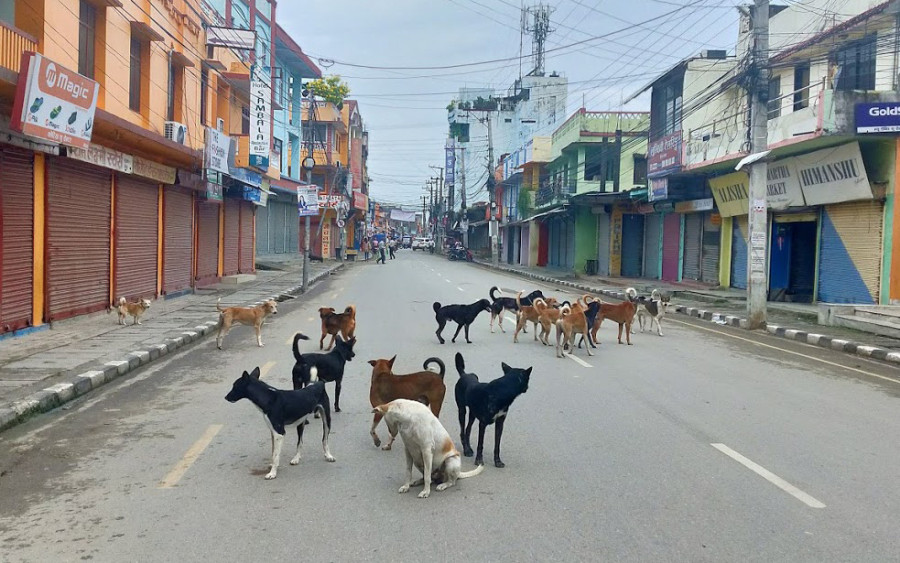Columns
A nation of gods deserves a law to match
We who honour dogs with garlands once a year should also protect them every day.
Ila Sharma
Walking through the streets of Kathmandu, I am often met by the curious eyes of street dogs, some limping, some dozing peacefully, others wagging their tails, and some barking at me. To many of us, they are not strays but neighbours next door. We feed these ‘community’ animals, care for them, and even give them names. And yet, when it comes to their rights and protection, our legal system offers little, rather a void.
Nepal is a nation of animal lovers. From religious stories and festivals to daily life, animals are woven into our emotional and cultural fabric. Yet this rich tradition of respect for other sentient beings has not translated into modern legal protections. The absence of a comprehensive Animal Welfare and Rights Act in Nepal needs to be addressed.
I was shocked during a recent interaction when the Minister for Agriculture and Livestock referred to animals merely as pashu dhan (livestock wealth) and claimed that community dogs and cats are becoming a problem. But the real problem is not the community animals; it is us. The nuisance some associate with these animals, like aggressive behaviour, noise at night, or the risk of disease, is a direct result of human neglect. Uncontrolled breeding, lack of vaccination and improper waste management are failures of our systems, not the animals themselves. With proper policies, these animals can live peacefully among us, just as our traditions have long envisioned. The solution lies not in blaming the animals, but in taking responsible, compassionate action.
The irony is sharp: In a country where citizens often act with more compassion than the state, animal welfare has become a burden carried by individual conscience and underfunded NGOs. Organisations like Animal Nepal, Sree’s Animal Rescue, SPCA Nepal, the KAT Centre, and many others, as well as some individuals I know, work tirelessly to rescue, sterilise and rehabilitate animals. They educate, vaccinate, and advocate, doing what should be done ideally by the government and the local authority. But without legislative backing, all these efforts rest on charity, not enforceable rights.
True that Nepal has issued an Animal Welfare Directive in 2019, which recognises animals as sentient beings, but it remains just that—a directive, not a law. It carries no penalties, no mechanisms for enforcement and no institutional structure to prevent cruelty or neglect. It may be well-meaning but toothless. Without clear laws, enforcement agencies are unsure how to respond, and compassionate citizens are harassed for simply feeding hungry animals. Cases of animal cruelty are also becoming commonplace, from disturbing rage-baiting cruelty Tiktok videos to mass poisoning of community animals. Rare cases of accountability are only when there is widespread outrage, else the Police have little idea of what steps to take when confronted with animal welfare issues.
What the law must do
A real Animal Welfare Act must do more than prohibit cruelty. It must define the rights. It should cover not only livestock and wildlife but also companion animals and community dogs and cats, whose lives unfold on our streets and doorsteps. Such a law should: (1) Recognise animals as sentient beings with a right to live free of pain and suffering; (2) mandate humane management of street animals, including sterilization, vaccination, and community caregiving models; (3) prohibit cruelty in all forms including but not limited to abandonment, abuse, neglect, and illegal/backyard breeding; (4) create an Animal Welfare Board with authority to inspect, monitor, and intervene; (5) ensure local governments are trained and equipped to implement welfare guidelines; and (6) incorporate education on animal compassion and responsible pet ownership in schools.
Nepal’s Constitution nudges us in this direction. Article 51(g) obliges the state to protect the environment and biodiversity. But the principle must be extended to urban ecology too—where humans and animals cohabitate not just by design, but by default.
During my time as Election Commissioner, I saw firsthand the strength of Nepal’s civic fabric. Despite all our difficulties, people participated, cooperated and upheld democracy not because they had to, but because they believed in it. That same belief exists today among the hundreds who feed, rescue and care for animals without ever expecting recognition. It is this quiet strength that animal welfare policy must now acknowledge. Because at its heart, how a society treats its voiceless members is a measure of its moral maturity.
Let’s be clear: This is not a “soft” concern meant for animal lovers alone. Animal welfare is deeply tied to public health (rabies control, zoonotic disease), urban planning, tourism and even mental health, offering comfort to countless people in cities struggling with loneliness and isolation. The harassment faced by feeders is well documented. Their unpaid, invisible care sustains thousands of animals and yet remains unacknowledged and even mocked at times.
The time is now
Nepal stands at a moment of policy reform in multiple sectors. If we can pass data privacy laws, federal education bills and environmental protections, why not a long-awaited Animal Welfare Act? It has been under discussion since 2015, with drafts languishing in various ministries. The political will is what’s missing, not public support.
To Parliamentarians and policymakers, I say this: Don’t mistake the silence of animals for the absence of need. Don’t leave it to the kindness of good citizens. Give us a clear, compassionate and enforceable law. To the people of Nepal, I say: Keep loving, keep caring, but now demand a law that reflects who we already are—a nation of quiet caregivers, of those who stop to feed, rescue, adopt and protect. Because a country that honours dogs with garlands once a year should also protect them every day of the year.
A posthumous publication




 10.12°C Kathmandu
10.12°C Kathmandu















